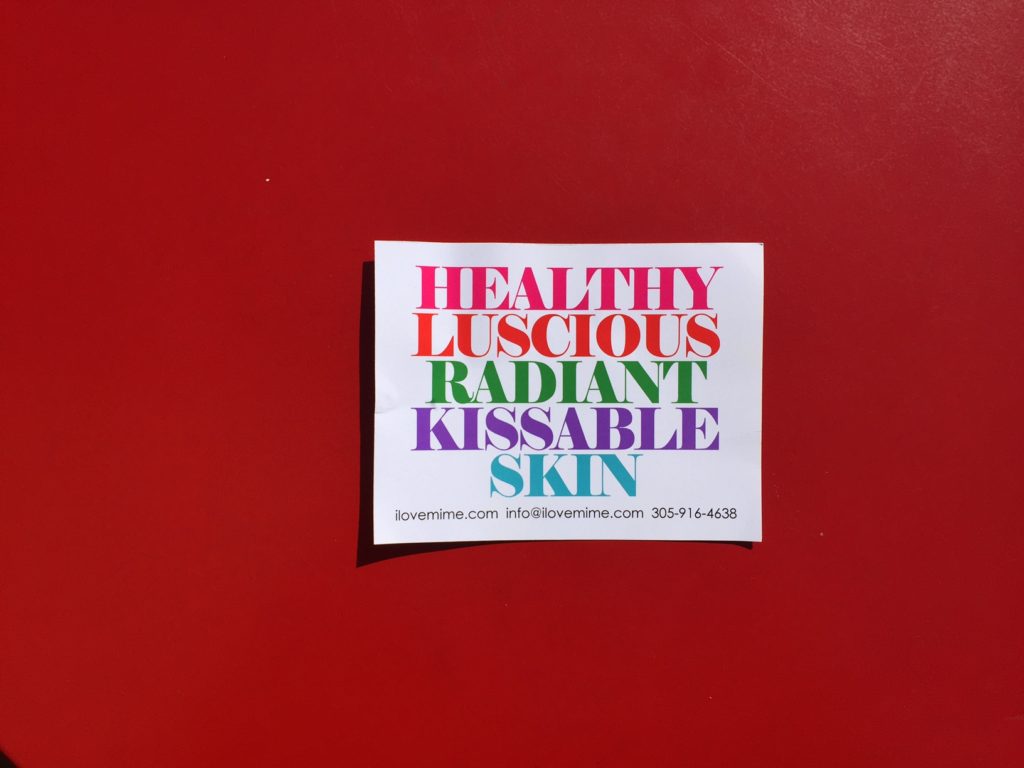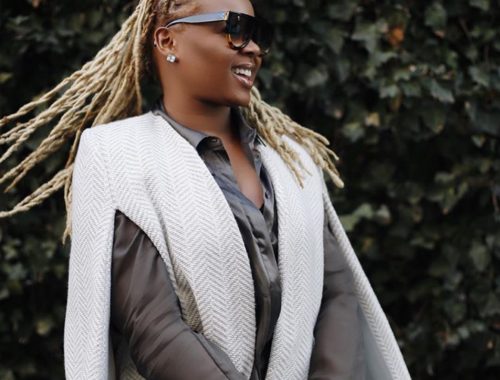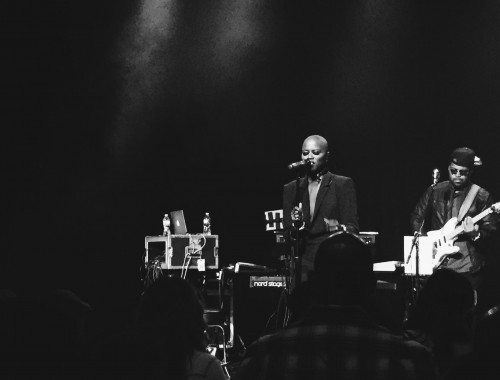All images courtesy of @ilovemime.
Just a few days ago I gave my review on the two Mi-Me Bath & Body products I absolutely loved (check it out here)! Now I want to shine some light on Gil and Liz to shine. The entrepreneur duo first connected in Memphis, Tennessee where they lived for about 8 years, but they’ve been friends for much longer than Gilbert can remember, and later found themselves back in their home state of Florida where all the handmade magic would begin. There is even a cool story on how the two decided on the name of their luxurious bath and body brand, along with a peek into their Haitian heritage and how it shapes the way Gil and Liz view beauty. Scroll down for the full chitchat!
OrganixLocs: What made the two of you decide on the name Mi-Me for the brand and does it mean anything in particular?
Liz Auguste: We were living in Memphis and one thing about Memphis it’s a city with a lot of hustle. Everyone you meet, it doesn’t matter who you meet, but everyone has three jobs; one of them is the career, the other job is maybe doing real estate or doing jams on the side. They’re doing something and [Gil and I] are like goodness this city is on fire. So I’m like ‘yo, we have to start something, we have to do something.’ I would [also] say that I’m a reformed product junkie and Gil could probably say the same thing yes?
“Since we’re from Miami and we moved to Memphis we took the ‘Mi’ from Miami and the ‘Me’ from Memphis so Mi-Me was born.” -Liz
Gilbert Chrispin: I wouldn’t say I’m reformed but…
LA: You’re not reformed I’m reformed. I’m reformed OK. So were like let’s do products. Let’s do products without crazy ingredients you don’t even know what the heck they are, that are effective, that are beautiful, that you know, are interesting. So we’re like cool what are we going to name this sucker? Since we’re from Miami and we moved to Memphis we took the “Mi” from Miami and the “Me” from Memphis so Mi-Me was born.
OL: Ahh so Mi-Me was born. That’s such a cool story!
LA: It’s all true, like, I wish it were fabricated but it’s even better because it’s more true!
OL: I know right its very authentic [Laughs]. How important was it for Mi-Me as a brand to be cruelty- free, eco- friendly, and also made in the U.S? I know a lot of times with different products having that quality is difficult because it’s made somewhere else too.
GC: I think for us it was very important. Being cruelty-free is such a huge thing. It makes no sense to put that harm on animals. Animals are very important, they play a role in the ecosystem, and we don’t want to contribute to destroying that. From an eco-friendly stand point; honestly I think we’re in it for a time period. I think we do so much damage to the environment so we try to preserve it as much as we can. We try not to do anymore harm if necessary. For us through our packaging, through our ingredients we really try to push that a bit. I think it’s also important for people to understand what they’re putting in their bodies and on their skin. We’re not really big on judging people, obviously you should do whatever works for you, but we want to at least give you all of the ingredients and all of the information in a very clear direct way so you can make that choice.

OL: That’s right.
Liz: I would also say part of the reason that we’re making the products and we haven’t out sourced it overseas, or whatever, is because in creating a business as entrepreneurs part of your desires is for ownership. If you have ownership but don’t really make the product how can you truly become intimate with it? How can you know exactly what you’re doing and exactly what you’re making? For me its part ownership and part pride because I know that everything I’m putting into this product I measured it or Gilbert measured it. I scooped it out I did all of this. Partly I did it because I love it but partly I did it because I think you deserve something that somebody has put their hands on and put some of their love into it. For me that part of the appeal of making something by hand because I love something handmade.
GC: For us, made in the U.S. is important because it’s a quality control measure. You know, Liz and I both have experiences with importing things from different countries and when you get it your like ‘Oh my goodness what happened!’ or ‘what is this?’
OrganixLocs: Aww man!
GC: Yeah. Also contributing to where you live I think is very important because why not give back to some degree if we can impact people and long term create jobs. If we can create partnerships that are long lasting that may motivate people to do something or to try something new. I think all is really important. Manufacturing has gone away in the U.S. and now it’s slightly coming back but on a smaller level.

OL: With Mi-Me both of your Haitian heritage and culture is in the forefront. Is there any Haitian beauty or skin care rituals that you two learned as you were younger but still use today?
[Gil and Liz chuckling and chatting between each other]
GC: For me there are two: in the Haitian culture castor oil for everything and anything. That’s always such a big thing in the Haitian community; castor oil is the cure all. Another on for me, from a beauty stand point, is always being very moisturized whether you’re using an oil or a butter. That is something that is still very well present in the Haitian culture. Like no ashiness ever!
[Gil and Liz laughing]
LA: Ok. Definitely castor oil and castor oil for everything. Castor oil for hair; if you have a cut castor oil; if you have a pain we use castor oil for everything. One thing I learned from Gil’s grandmother, which I never took heed as an adult or as a child, is to stay out of the sun. Gil’s grandmother is a beautiful woman. She looks so good, I don’t want to tell her age because that’s rude, but she’s over 50 years old.
GC: She’s over 80 years old.
LA: She looks amazing! She said “you know as a child I just stayed out of the sun.” I’m like I get it but I love the sun. I know just growing up in Miami it’s like the sun, the fun, the heat, but I still love the sun. So that’s one trick she said; put on a hat, wear your sunscreen and do all of that.
But second thing like Gil said is grooming. The one thing I will say growing up as a Haitian child is caring for yourself. Showering and lotioning up, powdering up, brushing your hair until it shines. Taking your time with yourself and grooming yourself because when you look good you feel good. Even my father, up until this day, he spends an enormous amount of time to get groomed. I always say Haitian men are the original metro-sexual because they’re always beautifully groomed. They’re always pressed, their always dressed, they’re always just clean. When you see a group of Haitian men they’re taking care of themselves and they’re doing it for themselves and Haitian women are the same way. I guess grooming and taking pride in appearance, that’s what the Haitian culture is all about. [You] take pride in who you are and how you look because it’s a reflection of your family. But definitely grooming, staying out the sun and castor oil; all day castor oil.
OL: What are some over looked aspects of the Haitian culture that you feel as though other people should know or learn more about?
GC: One underrated aspect is its beauty. Haiti is such a beautiful place with so many natural resources. That’s probably one of the most underrated things and I think when people go visit Haiti they’re so surprised. Obviously in the media we tend to see one side but if you live in Haiti and visit often its different; people go back to the states and declare they’re packing their bags [to come back]. Haiti is an adjustment but it’s such a beautiful adjustment. For the Haitian culture there are so many different types of Haitian people and there is always such a sense of pride. One of the underrated things about the culture is how much pride Haitian people have for their country, for their forefathers, and for some of the things they were able to accomplish and continue to accomplish.
OL: What about you Liz?
LA: The only thing I would add is the resilience of the Haitian people because they have gone through a lot that have been documented. Haitians have humor and resilience; they can laugh about almost anything. They can keep moving because as life goes on you have to keep going and if you don’t keep going everything is lost. Just the humor, right Gil, because at every moment there’s a joke, there’s a song. Oh my gosh people will make up a song at the drop of a hat. As crazy as that sounds [laughs].
GC: That plays a role for us too because we have bad days. You know we have bad days in the lab. We have bad days where maybe if you send something and the Post Office plays kick ball with it; we have those bad days as well. I think that also fuels us to be able to laugh and not necessarily dwelling in the bad news, or whatever is wrong at the moment, and really making a push through. Another thing I think is underrated is that Haitians have such a strong affinity for others. They have such a kinship with the African-American community; we share so may similarities and in many ways have experienced some of the same hardships. In the Haitian community there is a sense of connection and brotherhood. Once you look deeper you’ll see that all we want to do as Haitians and as people is come back.
LA: Yes.
GC: No matter race, culture or religion we just want to connect and that’s related to Mi-Me. We just want to connect people to a time when you know you were caring for yourself; we’re really big on self care so taking time out for yourself, taking moments out for yourself. With our products we try to allow you to connect with yourself and to even share with friends.

There you have it from Gil and Liz themselves. It was a great pleasure to learn about the Mi-Me and how there their Haitian culture as young entrepreneurs plays a part in their brand. Check out the product review to see how I enjoyed my two fave products and then go support them at www.ilovemime.com!




